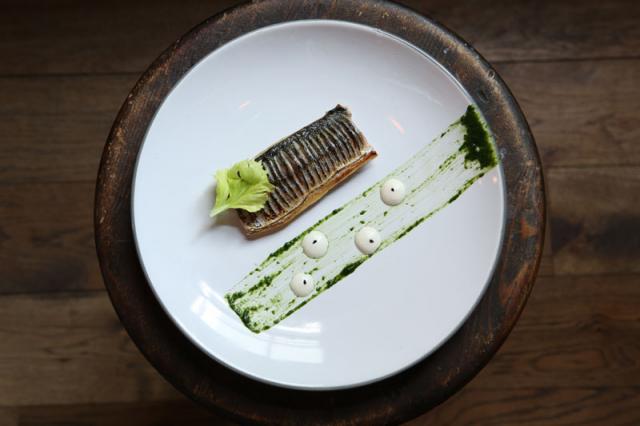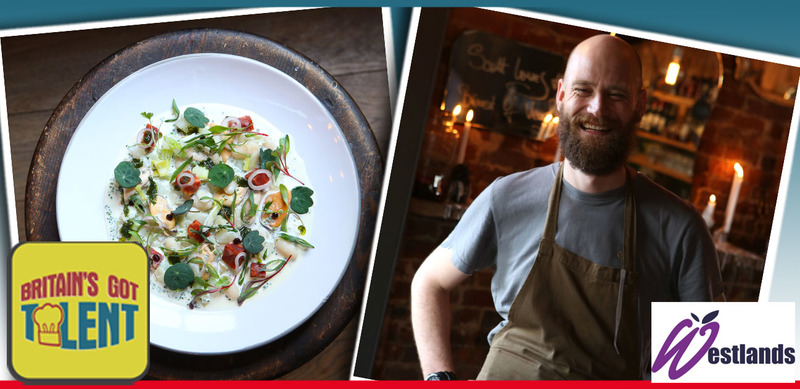Scott Goss, Chef Patron, The Twenty Six test kitchen
Scott Goss, chef patron of The Twenty Six test kitchen and Creative Director of the I’ll Be Mother Group, left college early to work with Gary Rhodes at City Rhodes and never looked back.
He has since worked with Anton Adelman, Robert Spencer and Andrew Clarke learning to cook the best British, French classic and European style food. His first head chef role was in Kent at The Swan in West Malling and from there he took on The Twenty Six test kitchen in 2014 part of the I’ll Be Mother Group, owned by Peter Cornwell who Scott says is his mentor. The restaurant in Southborough,
Tunbridge Wells, has twenty six chairs for twenty six people and 'every day is a blank canvas and a changing menu'.
The Staff Canteen spoke to Scott about his obsession with discovery, the intensity of working in a Michelin-starred kitchen at 17 and why for him, accolades take a back seat to a restaurant full of happy diners.

Blowtorched Mackerel, Parsley
and Horseradish
Why did you want to be a chef?
I was always surrounded by amazing food, mum was a great cook at home and there was always that home cooked family meal on the table. My mum was a fruit picker, she was out in the orchards every day during the different seasons and when I was a kid I was always on the farm with mum. I was probably eating more fruit than she was picking! I grew up in Devon and I was surrounded by amazing food and produce, it wasn’t unusual to go round nan’s house and there would be a crab in the sink for lunch. No one in the family was a chef though and there were a few eyebrows raised when I said that’s what I wanted to do.
You left college early to take a job with Gary Rhodes, are you glad you did it that way round?
I was very young, I think 17 at the time, my lecturer at college told me to take the job and not worry about the third year. I was way out of my depth in an environment of that standard. City Rhodes had just opened and it was the first place in London cooking British fine dining food or his style food, to get a star. It was massively intense but that was the start for me really.
What was it like being thrown in at the deep end?
Gary was there he was very hands on and Adam Gray was the head chef, exceptionally talented guys who you couldn’t help but learn from. I pushed myself bloody hard early doors, I was the commis and always first one in the kitchen despite not living in London working until midnight five days a week – I don’t know if it was madness or stupidity! I found out a lot about myself, you hear people say they are committed but even here the boys that shine are the ones that do a deep clean on a Saturday night and it’s rocking on for one in the morning. The same boys who are in at 8am, lighting the stoves and producing the most beautiful Sunday lunch, without a fuss and understanding the journey we are on.
And what was Gary like in the kitchen?
He was a true perfectionist, his cooking style I always describe as ‘frustratingly effortless’. But it wasn’t, it was technically very difficult, everything was done to the letter and there were no corners to cut. His eyes were on everything, he was a very hard but very fair man. And he was very dedicated to training the young guys, which was great and he genuinely has a passion for the industry.
After five years with Gary cooking at both City Rhodes and Rhodes in the Square, you then went to work for Anton Adelman, how was that?
Again another master of our trade, 21 years at the Savoy, I was thinking ‘this guy knows a bit’. I did a year with him and I was very interested to get in under the skin of the classical French style of cooking. Anton is so calm in the kitchen, so quiet, there’s no swearing and if you felt you were going to boil over you had to go outside and have a time out.
He had such respect for the ingredients and he used to tell us to stop rushing and slow down, he’d say’ it takes such a long time for the fish to grow, why are we in such a rush to cook it in a roasting hot pan?’ His philosophies and theories made you take a step back and question everything you’d been taught.
You went on to work with Robert Spencer and then you took a step back from the London scene, had you done too much too young?
I hadn’t burnt out or anything I just wanted to take a step back, I obviously still wanted to cook and with my roots in Kent I came across The Swan in West Malling and I thought it was perfect. A tiny little brasserie, just getting itself established, a really lovely place. The foraging thing had just come in so I was going out with the head chef Andrew Clarke in the fields of Kent teaching ourselves, we’d bring it back to the kitchen and it was just a discovery and path we were going down.
I thought it would do me for six months, catch my breath then head back to London or travel. But ten years down the line and I’m still with Peter Cornwell who was one of the partners there at the time, he branched out on his own and created the I’ll be Mother group and I followed my mentor I guess.
Everyone I worked with, they were massive characters and I guess that was the most daunting thing when it was time to express Scott Goss, suddenly I was the guy everyone was looking at. I was obsessed with discovery, and still to this day I have a massive fear of failure. So from day one of that role I shut myself in a box and created, from that two rosettes came very early from the AA, a Bib Gourmand in 2010 – which was fantastic but accolades were not my aim. I’m not a competitive person and I have never cooked for Michelin, I don’t like to set unrealistic goals or aims I’m not particularly comfortable with.
If I can go into the dining room, whatever kitchen I’m in and it’s full of happy diners – that to me is a job well done.
You are now Chef Patron at The Twenty Six test kitchen, part of the I’ll Be Mother Group who you are also Creative Director for. Talk us through this role and the dishes people can expect from the menu here.
We opened Twenty Six in 2014 and it’s taken until now for me to have a clear idea of the direction I want to take it. I had a bout six months rewriting menus but now I think I’m on a comfortable path of what the customers want and are coming back for. I think I’ve taken bits from all the chefs I’ve worked with and my signature dish is smoked haddock rarebit and the rarebit is absolutely Gary Rhodes recipe, it’s my homage to him.
We do a cabbage side dish and we literally char it, steam it and serve it simply in a bowl with sea salt and the reason we do our cabbage that way is it takes me back to my childhood, of my nans overcooked cabbage and it’s really close to my heart, I’ve replicated that for our diners. The feedback on it is ridiculous, it’s a side order and people are more interested in how I do my cabbage than the rarebit!
All of our dishes have a story, they have a meaning – I’m getting to that stage in my career of actually building a repertoire. The name the ‘test kitchen’ is really coming into its own, I’m growing in confidence to evolve my dishes because I’m comfortable with my style of cooking.
What about ingredients, how do you source those?
I was used to a big kitchen so I’m lucky here, it’s smaller and I can use local, small suppliers. I will only ever be as good as the ingredients which come through my door. I don’t want bags of washed carrots coming into my kitchen, I want dirty carrots straight out of the ground, all irregular sizes and which look like a f***ing carrot! That’s so important to me. Mother Nature is the true artist in everything we do, we just muddle her ingredients together and put them on a plate at the end of the day. Ingredients should be cooked with knowledge, respect and love, will always look beautiful to me.
How many chefs do you have in the kitchen and do you enjoy passing on your knowledge?
There are three, it’s a small team and a young team but they are very dedicated. I feel like it’s our responsibility to train the next generation coming through because there are some bloody good lads out there.
What’s really exciting about the industry now and what’s changed massively is the world of social media. Nothing makes me happier than seeing an Instagram picture from Sat Bains for example because everyone is so open now to what they are doing in their kitchens. It’s no longer this hidden secret and I love that because it’s really encouraging and it’s great for the young lads to see and learn what other people are doing in their kitchens. It also allows chefs you’ve never heard of before to come to the forefront, there are some f***ing hard workers out there and they should be championed.


{{user.name}}